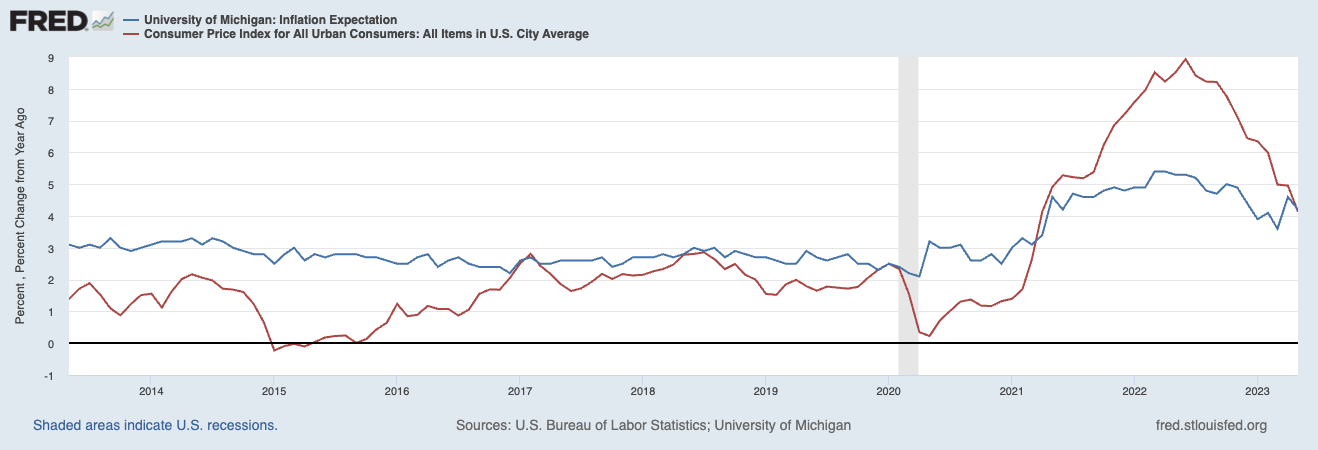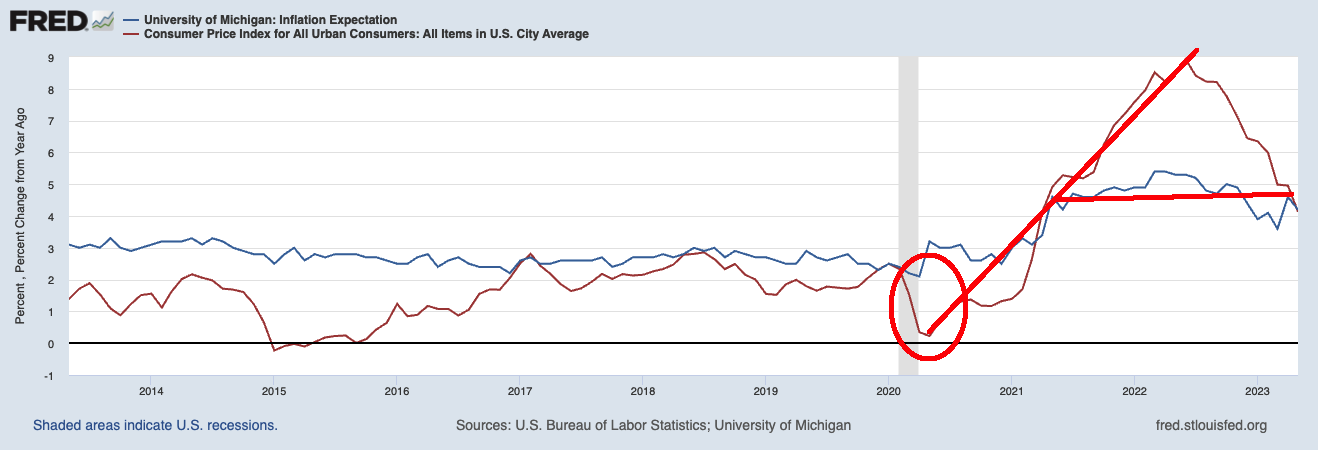This morning, the WSJ reported that “Shoppers count on to see 4.1% inflation a 12 months from now, the bottom such studying in two years and down sharply from its latest peak of 6.8%.”
There are some who consider that is excellent news, however as we identified in Could, it’s a meaningless, lagging survey. Actually, it might be even worse than that, as a result of it seems that some on the Federal Reserve truly consider the Fed’s personal survey of customers comprises info. As we’ve got beforehand proven (repeatedly), it doesn’t.
A minimum of, it doesn’t include beneficial info offering perception into future inflation ranges. What it does reveal is that the Federal Reserve isn’t present with the newest analysis on 1) What drives inflation; 2) The fallibility of surveys and polling knowledge; 3) An up to date understanding of behavioral economics and the way human decision-making works.
Final we famous, Sentiment Surveys are usually ineffective; their most beneficial moments happen at extremes, that are sometimes seen in hindsight. Folks don’t have any capacity to forecast issues like what inflation shall be like 1, 3, or 5 years therefore. They’ll (arguably) extrapolate out present CPI a number of months or quarters, however even that is perhaps too beneficiant. And whereas individuals’s expectations can issue into inflation, it’s however one factor out of many, and one that’s simply modified.
Because the FRED chart under reveals, customers have been fairly sanguine about inflation in the beginning of its large run-up in 2021; they have been panicked about inflation on the peak, simply because it was starting its collapse. In case you purchased Inflation Futures primarily based on Client expectations, you’d shortly go broke.
To say this can be a helpful measure reveals an irrational attachment to an outdated commonplace. As Brookings defined, this traces again to the late Nineteen Sixties work by Nobel laureates Edmund Phelps and Milton Friedman. They centered on inflation expectations as a result of ties between inflation and unemployment. Persistently excessive inflation within the Seventies turned unanchored, as long-running inflation led to larger wage calls for. The phenomenon of the wage-price spiral endured within the Seventies and 80s.
It appears to nonetheless be persisting amongst sure economists, who’ve ignored what occurred post-pandemic/post-fiscal stimulus: Regardless of CPI spiking larger, unemployment continued to fall.
Take into account what occurred for the reason that Seventies: Globalization elevated, automation turned widespread, and productiveness elevated dramatically. I think these components are a part of the rationale why inflation and unemployment have decoupled. The opposite half is that the economic system is simply so totally different right this moment than it was 50 years in the past, that utilizing a Seventies analog is a recipe for failure.
The complete idea of the Environment friendly Market Speculation (which received a Nobel prize for Eugene Fama) was that what individuals say about something is way much less beneficial than what they do, particularly with their hard-earned {dollars}. Whether or not they make investments it out there or purchase inflated shopper items is itself a supply of beneficial info; definitely a lot better than asking them what they thought inflation is perhaps someday within the distant future.
Individuals who ought to know higher pay approach an excessive amount of consideration to Inflation Expectations. The charts above present that they shouldn’t…
Beforehand:
Inflation Expectations Are Ineffective (Could 17, 2023)
Transitory Is Taking Longer than Anticipated (February 10, 2022)
No person Is aware of Nuthin’ (Could 5, 2016)
How Information Seems to be When Its Previous (October 29, 2021)
No person Is aware of Something
Supply:
Good Information for the Fed: Buyers See Decrease Inflation on the Horizon
By Christian Robles
WSJ, July 3, 2023




